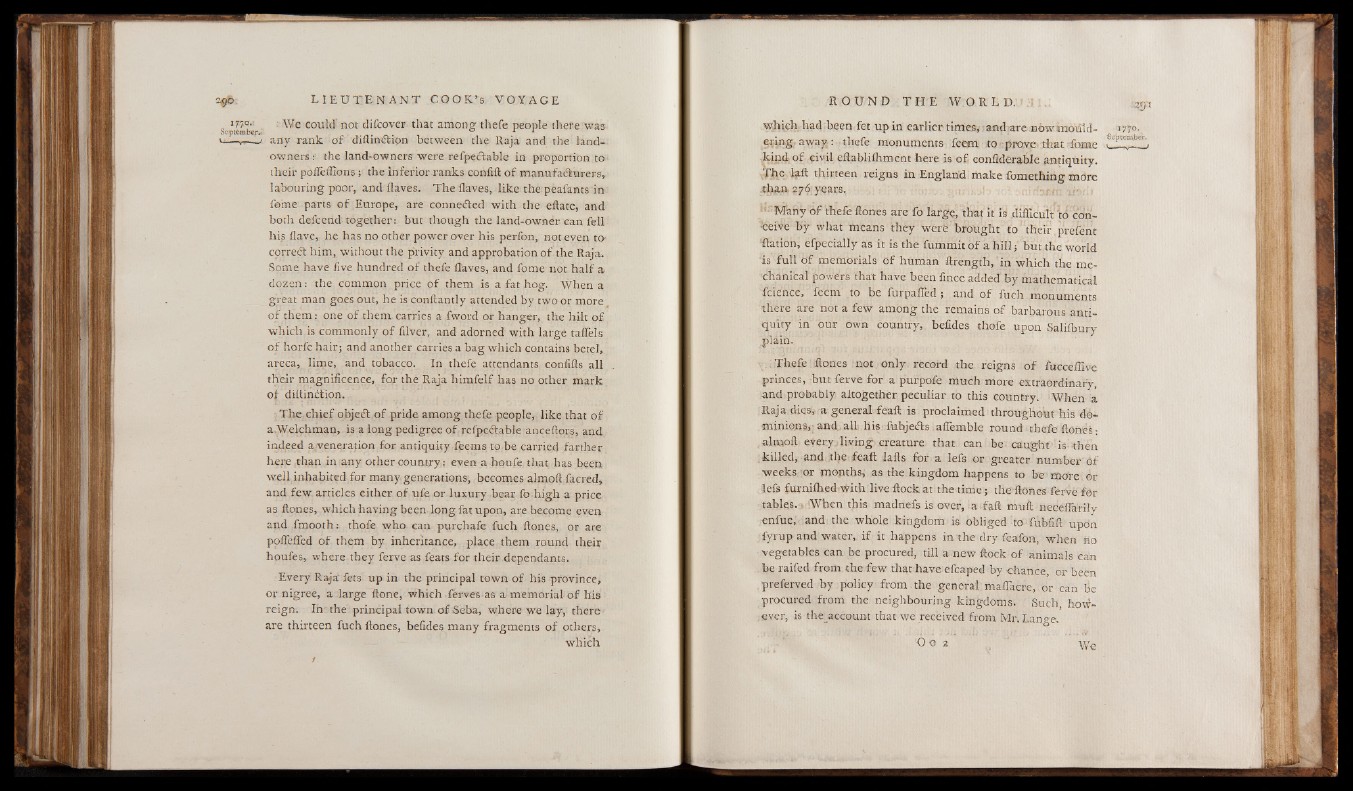
i77°-; We could not difcover that among thefe people there was September.!!- , t ° r r
'----v——i any rank o f diflindlion between the Raja and the landowners
:: the land-owners were refpectable in proportion to >
their pofieffions; the inferior ranks confifl of manufacturers,,
labouring poor, and flaves. The Haves, like the peafants in
feme parts of Europe, are connected with the eflate, and
both defcend together: but though the land-owner can fell
his Have, he has no other power over his perfon, not even to-
cprrect him, without the privity and approbation of the Raja,
Spine have five hundred of thefe flaves, and fome not half a
dozen: the common price of them is a fat hog. When a
great man goes out, he is conflantly attended by two or more,
of them: one of them.carries a fword or hanger, the hilt of
which.is commonly of fiver, and adorned with large taffels
of horfe hair; and another carries a bag which contains betel,
areca, lime, and tobacco. In thefe attendants confifls all
their magnificence, for the Raja himfelf has no other mark
of diftinCtion.
■ The chief object of pride among thefe people, like that of
a.Wclchman, is a long pedigree of. refpeCtable anceftors, and
indeed a/veneration for antiquity fpems to be carried farther
here than in any other country: even a houfe that has been
well.inhabited for many generations, becomes almofl faered,
and few articles either of ufe or luxury bear foffiigh a price
as ftones, which having been long fat upon, are become even
and fmooth: thefe who can purchafe fuch Hones, or are
ppffefled of them by inheritance, place them round their
houfes, where they ferve as fears for their dependants.
Every Raja fets up in the principal town of his province,
or nigree, a large Hone, which ferves as a-memorial of his
reign. In the principal town of Seba, where we lay, there
are thirteen fuch Hones, befides many fragments of others,
which
/
which had been fet up in earlier times,- and are nowsmodld-
e p g - away : thefe monuments, feetn to prove that fame
.kind of civil eflabliffiment here is of conflderable antiquity.
The lafl thirteen reigns in -England make fomething more
than, ^76; years,
' Mhhy of thefe Hones are fo large, that it is .difficult m cancel
vë by what means they were brought to their prefent
‘flation, efpecially as it is the fûmmit 6f a hill ; but the world
is fuir iff. memorials of human Hrength, in which the mechanical
powers that have been fince added by mathematical
fcïënce, feëm to be furpafled ; and of fuch monuments
there are not a few among the remains of barbarous antiquity
in our own country, befides thofe upon Salifbury
plain.
Thefe Hones not only record the reigns of fucceffive
princes, but ferve for a purpofe much more extraordinary,
•and probably altogether peculiar to this country. When a
Raja dies, a general feaH is proclaimed throughout his déminions,
and, all his fuhjeéls aflemble round thefe flonèè-
alnjoH every..living-, creature that can be caught is--then
killed, and .the feaH lafls for a lefs or greater number Pf
weeks,-or months, as the kingdom happens to be more ©r
lefs furniffied with live flock at the time ; the Hones fervé fôr
tables, viWhen this madnefsis over, :a fàfl mufl necëfiarily
enfue, and the whole kingdom is. obliged to-fubfifl updn
fyrup and water, if it happens in the dry feafon, when no
vegetables can be procured, till a new flock of animals can
be raifed from the few that have efcaped by chance, or beën
.preferred by policy from the general maflacre, or can be
procured from the neighbouring kingdoms. Such, however,
is the account that we received from Mr. Lange,
1770.
■ September.
I 1
O -o We
■ ■